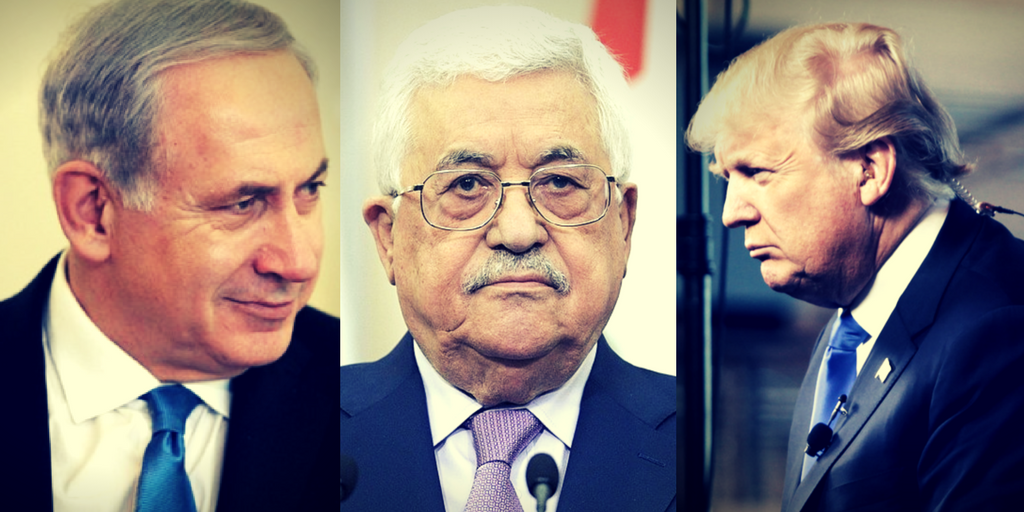If the peace process ends, Netanyahu will present his own plan.
You wouldn’t know it from the news, but this week, the probability that Israel will apply its law to areas of Judea and Samaria rose significantly.
This week was first time that either Prime Minister Binyamin Netanyahu or the Trump administration ever addressed the possibility of Israel applying its law to areas of Judea and Samaria.
Lawmakers from Bayit Yehudi and the Likud have prepared separate bills on the issue. MK Bezalel Smotrich’s Bayit Yehudi party bill calls for Israel to apply its law to Area C – the parts of Judea and Samaria located outside Palestinian population centers.
The second bill, proposed by Likud MK Yoav Kisch, calls for Israel to apply its law to the Israeli communities in Judea and Samaria. The Likud’s central committee unanimously passed a resolution in December calling for the government to implement such a policy.
On Monday, Netanyahu met with the Likud Knesset faction to convince the lawmakers to postpone consideration of Kisch’s bill. Netanyahu gave two justifications for his position.
First, he said that he wants to discuss the issue with the Trump administration. Netanyahu explained, “On the topic of applying sovereignty [in Judea and Samaria], I can tell you that for some time now I have been discussing the issue with the Americans.”
Netanyahu continued, “Our relationship with them is a strategic asset to the State of Israel and the settlement enterprise.”
Netanyahu’s statement was very general. The media chose to interpret it to mean that Netanyahu was lobbying the Trump administration to support the application of Israeli law to parts of Judea and Samaria.
But that is not at all what he said. He said that he is discussing the issue with the Americans and that he wants to maintain the good relations Israel now enjoys with the Trump administration because those relations are a strategic asset for Israel.
The second guiding principle Netanyahu said inform his position on applying Israeli law to parts of Judea and Samaria contradicts the notion that he wants the Trump administration to adopt the cause of applying Israeli law in Judea and Samaria as an American position.
Netanyahu said he opposes Kisch’s bill because he believes that applying Israeli law to the Israeli communities in Judea and Samaria is “an historic undertaking.”
Netanyahu said, “This has to be a government initiative and not a private one, because this is a historic undertaking.”
Before considering the implications of Netanyahu’s second guiding principle, we need to examine carefully consider the US position on the issue.
Netanyahu’s general statement to the Likud Knesset faction provoked a media maelstrom. The outcry compelled the Trump administration to respond. The manner it responded to the media storm was instructive.
The administration’s first response came at the conclusion of Secretary of State Rex Tillerson’s meeting with Egyptian Foreign Minister Sameh Shoukry in Cairo. Tillerson was in Egypt on the first leg of his regional tour to Egypt, Jordan, Lebanon, Turkey and Saudi Arabia. Given his hosts’ opposition to President Donald Trump’s recognition of Jerusalem as Israel’s capital last December, the State Department was certainly not interested in having the US embroiled in Israeli discussions about applying Israel law to areas in Judea and Samaria.
And yet, in his media appearance, Tillerson ignored the issue. He told reporters, “The Trump administration remains committed to achieving a lasting peace agreement between the Israelis and the Palestinians.”
As the media storm in Israel and the region over Netanyahu’s remarks expanded with Palestinian condemnations of his statement, a senior diplomatic source in Jerusalem clarified Netanyahu’s remarks to reporters.
The senior diplomatic source explained that Netanyahu “has not presented the United States specific proposals for annexation, and the US has not expressed its agreement with any such proposal. Israel updated the US on the varying proposals that have been raised that the Knesset. The US expressed its clear position that it wishes to advance President Trump’s peace plan. Prime Minister Netanyahu’s position is that if the Palestinians maintain their refusal to negotiate, Israel will present its own alternative.”
This statement is the most revealing statement any senior official has made on the issue of applying Israeli law to areas of Judea and Samaria. The senior official told us several things we didn’t know.
First, Netanyahu plans to wait to present any new Israeli position on Judea and Samaria until after Trump presents his peace plan.
Second, Netanyahu will postpone consideration of any plan to present an independent Israeli initiative if the Palestinians agree to return to the negotiating table.
Finally, like Tillerson, the senior Israeli official did not say that the US opposes Israeli plans to apply Israeli law to parts of Judea and Samaria.
Later on Monday, in response to virulent criticisms of the US following Netanyahu’s remarks, the Trump administration stiffened its tone.
White House spokesman Josh Raffel issued what the media presented as a harsh rebuke of Netanyahu’s statement before the Likud Knesset faction members.
“Reports that the United States discussed with Israel an annexation plan for the West Bank are false, Raffel said.
“The United States and Israel have never discussed such a proposal, and the president’s focus remains squarely on his Israeli-Palestinian initiative.”
Did Raffel’s statement tell us anything new? Not really.
The senior diplomatic source said Netanyahu has updated the administration on the various proposals for applying Israeli law to areas of Judea and Samaria. He didn’t say Netanyahu held discussions with administration officials about the various proposals. And the senior diplomatic source said that the US remains committed to advancing Trump’s peace plan.
In other words, there is no inherent contradiction between Netanyahu’s statement at the Likud faction meeting, the statement by the Israeli senior diplomatic source, Tillerson’s statement and Raffel’s statement. None of them said that Israel is interested in having the US support applying Israeli law to Judea and Samaria. None of them said the Trump administration opposes applying Israeli law to Judea and Samaria.
They all said the Trump administration is committed to advancing its own peace plan.
The sense that the dispute between Netanyahu and the White House was more apparent than real was reinforced on Tuesday at the State Department press briefing.
State Department spokeswoman Heather Neuert had no response to the news that the Knesset passed legislation placing Ariel University under the auspices of the Council of Higher Education, instead of a designated special council that deals specifically with higher education institutions in Area C. Like everyone else, she restated the administration’s commitment to advancing its own peace plan.
And this brings us to the peace plan the administration is now preparing.
Diplomatic sources in Jerusalem say that Netanyahu has presented two positions that he believes must be incorporated in any peace plan to ensure that the plan, if implemented will produce peace rather than war.
First, Netanyahu insists that the Palestinians must recognize Israel’s right to exist.
Second, Netanyahu insists that Israel must maintain permanent control over the eastern border with Jordan.
These goals are eminently reasonable. Israel cannot share sovereignty west of the Jordan River with an entity that rejects its right to exist. So any peace deal must involve Palestinian acceptance of the Jewish state’s right to exist.
By the same token, even in an era of peace, Israel cannot surrender its ability to defend itself. Since Israel cannot defend itself without perpetual control over the Jordan Valley, Israel cannot sacrifice its control over the Jordan Valley. Any deal Israel strikes with the Palestinians that does not include perpetual Israeli control over the Jordan Valley is a recipe for war.
If Trump accepts Netanyahu’s position and incorporates it into his peace plan, then as far as Netanyahu is reportedly concerned, the negotiations can begin in earnest.
On the other hand, if the Palestinians refuse to accept these conditions, then the peace process will be over.
And if the peace process ends, Netanyahu will present his own plan. That plan, apparently will look a lot like the Likud central committee’s plan to apply Israeli law over the Israeli communities in Judea and Samaria.
Rather than supporting someone else’s bill, Netanyahu will present the plan to the cabinet for approval and then introduce it as a bill to the Knesset, just as then prime minister Menachem Begin applied Israeli law to the Golan Heights in 1981.
While all of these developments may appear odd, we have been here before.
In many ways, the situation today recalls the situation in 1992. In 1992, the US was sponsoring peace talks between Israel and its Arab neighbors in Washington. Without informing the Americans, after taking office in 1992, the government of Yitzhak Rabin and Shimon Peres began carrying out secret talks with the PLO under the auspices of the Norwegian government in Oslo.
After the first Oslo deal was concluded in August 1993, Rabin sent Peres and then-Foreign Ministry legal adviser Joel Singer to the US to brief then-secretary of state Warren Christopher on the agreement. Rabin hoped Christopher would agree to present the deal as an American peace plan. Rabin believed that the Israeli public would be more supportive of a deal with an American imprimatur.
In a 1997 interview with Middle East Quarterly, Singer described the meeting with Christopher. Singer recalled that as Christopher read the agreement for the first time, a shocked look came over his face. “His lower jaw dropped, and for the first and last time in my life, I saw Warren Christopher smile.”
But Christopher rejected Rabin’s request, all the same.
“Secretaries of state are not supposed to lie,” he told Peres and Singer.
Just as the Clinton administration was not willing to take the lead on a new strategic trajectory that placed Israel and the PLO on equal footing, so the Trump administration is not willing to initiate a new post-Oslo Middle East.
That is Israel’s job today just as it was Israel’s job in 1993.
A close reading of Netanyahu’s statement to the Likud Knesset faction makes clear that he understands this basic truth. And a close reading of the statements and counter-statements from Jerusalem and Washington following his briefing to the Likud Knesset faction indicates that if and when Netanyahu embarks on a new course, like Bill Clinton and Warren Christopher in 1993, Trump and his advisers will not stand in his way.





